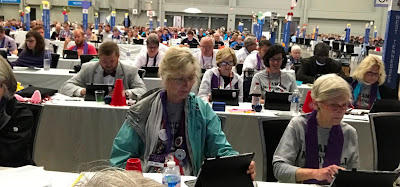Questions are still swirling about the intent and impact of this important resolution. Here is what I said when I spoke to it on the floor:
I rise in favor of B012 — a resolution that will move us beyond the seemingly intractable challenge of living together as a church where the sacramental marriage that has been authorized for all couples in the Episcopal Church is irreconcilable with the theological conscience of some members of the Episcopal Church.
Make no mistake about it: it contains costly compromises that come with very real pain. Pain for those who will experience this action as falling short of the full and equal claim for the LGBTQ baptized we have been striving for since 1976. And pain for those who will experience this action as a bridge too far away from their belief that marriage is only between a man and a woman.One of the primary questions I'm getting is a form of "What about DEPO?"
The question for this General Convention is whether the gift of walking together forward into God's future as members of the Episcopal branch of the Jesus Movement is worth the painful compromises we are mutually being asked to bear in order to make that possible.
I believe the answer is yes and I urge support for Resolution B012 as Proposed by Committee 13 so that we may continue to walk forward together.
Here's what I've got ... a bit on the fly between legislative sessions:
DEPO -- Delegated Episcopal Pastoral Oversight -- was part of the original version of B012 and was changed via amendment by Legislative Committee 13. As a member of that committee, I can attest that the changes we made were in response to hours of testimony from both proponents of same-sex marriage from the eight dioceses where marriage for all is not yet a reality and from seven of the eight bishops with jurisdiction in those dioceses.
What we heard was that the relationships between the bishop and dissenting parishes are not irreparably damaged -- simply challenged on this issue of sacramental marriage. In response, this carefully crafted compromise language -- crafted in consultation with bishops from across the theological perspective -- recognizes that reality and seeks to provide an option that protects both theological conscience and sacramental access for all.
For more clarity, I turn to these wise words from Deputy Christopher Hayes:
B012, if adopted by the House of Bishops in the same form, gives the Rector or Priest-in-Charge of the congregation full authority to use the marriage liturgies for same-sex couples. If the officiating priest or the couple for some reason need pastoral support of a bishop, and the diocesan bishop has theological objections, another bishop should be invited to provide that pastoral support.
This is not DEPO, which presumes a broken relationship between the bishop and the congregation, so that another bishop must take over the pastoral relationship and ecclesiastical authority over that congregation for all purposes. B012 does not provide for that. It provides only for another bishop to be invited in if, and only if (1) the officiating priest needs pastoral support for the particular marriage (rarely), or (2) permission is needed for marriage after prior divorce.
Note that the priest officiating at a marriage rarely needs to consult with the bishop for any reason whatsoever (as long as neither of the betrothed was previously divorced)Some other important points to note:
- B012 is a carefully crafted compromise that balances couples' access to liturgies for marriage, including same-sex couples, with room for all to agree or disagree.
- While this decision defers adding the trial liturgies for marriage until prayer book revision is completed, it provides improved access to the liturgies in the meanwhile.
- It clarifies role of Rector and provides options for bishops to invite other bishops to assist in pastoral work, without prescribing exactly what that looks like in every situation.



No comments:
Post a Comment